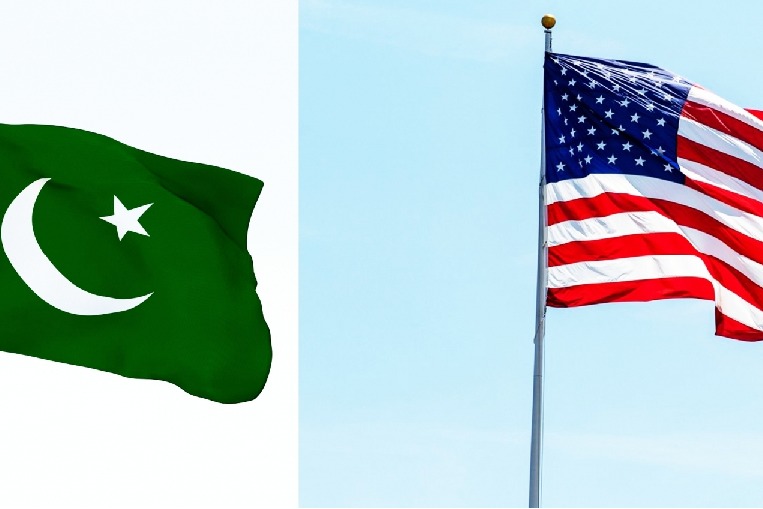'US has an endless appetite for Pakistan's con games'

New Delhi, Sep 11 : Pakistan has spent decades setting fires in South Asia and then expected praise and remuneration for offering to put them out.
C Christine Fair, Professor at Georgetown University's security studies program within the Edmund A. Walsh School of Foreign Service writing in Foreign Policy, says that Washington has an endless appetite for Islamabad's con games.
"It's astonishing that US officials continue to peddle Pakistan's own fictions-alongside such media outlets as the BBC, as I discovered recently when I was cut off in the middle of an interview for speaking about it," Fair wrote.
She said even though Pakistan's involvement in Afghanistan goes back some seven decades, the Washington elite continues to fall for Pakistan's efforts to sell itself as the solution to the very problems it created.
"With the US Embassy in Kabul shuttered, the US is very likely to do what it usually does: go back to the arsonist and sustain the pretense that it is in fact the fire brigade. The US will likely find itself more dependent on Pakistan as it seeks a foothold to retain intelligence cooperation and likely drone basing for targeting the terrorist refuges in Pakistan, even while Pakistan continues to cultivate the same refuges," Fair says.
Pakistan will continue to provide the minimal results to justify the expenditures to a US Congress that is always wary of Pakistan but not enough to do anything meaningful to curtail its myriad outrages.
"In the meantime, Pakistan's militant assets cultivated for action in India will benefit enormously from the terrorist safe havens protected by the Taliban led house of horrors that is the Afghan government," she adds.
After Mohammed Daoud Khan came to power in Afghanistan in 1973 and established a one-party republic that embarked on an aggressive top-down social reform program and purged Islamists and communists alike, Pakistan saw an opportunity.
Zulfikar Ali Bhutto took the helm of a vivisected Pakistan, which lost half of its population when Bangladesh gained independence in a 1971 war.
Bhutto resolved to lose nothing else, as per the article.
In August 1973, Bhutto set up the Afghan working group within Pakistan's Inter-Services Intelligence (ISI) directorate. Despite a brief interregnum, Gen. Muhammad Zia-ul-Haq continued with this policy after he ousted Bhutto in a July 1977 coup, it said.
Fair added that Pakistan opines that it is the real victim of terrorism, that it is being unjustly maligned, and that if the West wants to fight terrorism, it needs to give Pakistan more money-and ignore its wrongdoings, which include sponsoring numerous Islamist terrorist groups as well as vertical and horizontal nuclear proliferation.
Islamabad understands the value of congressional delegations in shaping policymakers' opinions. Unlike protocol-bound India, Pakistan dispenses with all diplomatic protocol on these occasions.
Delegates meet the army chief, the ISI chief, and the prime minister, and they are often treated to military tourism opportunities, Fair said.
In addition to having lavish budgets for legal lobbyists, Pakistan also has a history of cultivating shadowy figures who launder Islamabad's dirty laundry and promote its pet projects to American policymakers and opinion-makers.
C Christine Fair, Professor at Georgetown University's security studies program within the Edmund A. Walsh School of Foreign Service writing in Foreign Policy, says that Washington has an endless appetite for Islamabad's con games.
"It's astonishing that US officials continue to peddle Pakistan's own fictions-alongside such media outlets as the BBC, as I discovered recently when I was cut off in the middle of an interview for speaking about it," Fair wrote.
She said even though Pakistan's involvement in Afghanistan goes back some seven decades, the Washington elite continues to fall for Pakistan's efforts to sell itself as the solution to the very problems it created.
"With the US Embassy in Kabul shuttered, the US is very likely to do what it usually does: go back to the arsonist and sustain the pretense that it is in fact the fire brigade. The US will likely find itself more dependent on Pakistan as it seeks a foothold to retain intelligence cooperation and likely drone basing for targeting the terrorist refuges in Pakistan, even while Pakistan continues to cultivate the same refuges," Fair says.
Pakistan will continue to provide the minimal results to justify the expenditures to a US Congress that is always wary of Pakistan but not enough to do anything meaningful to curtail its myriad outrages.
"In the meantime, Pakistan's militant assets cultivated for action in India will benefit enormously from the terrorist safe havens protected by the Taliban led house of horrors that is the Afghan government," she adds.
After Mohammed Daoud Khan came to power in Afghanistan in 1973 and established a one-party republic that embarked on an aggressive top-down social reform program and purged Islamists and communists alike, Pakistan saw an opportunity.
Zulfikar Ali Bhutto took the helm of a vivisected Pakistan, which lost half of its population when Bangladesh gained independence in a 1971 war.
Bhutto resolved to lose nothing else, as per the article.
In August 1973, Bhutto set up the Afghan working group within Pakistan's Inter-Services Intelligence (ISI) directorate. Despite a brief interregnum, Gen. Muhammad Zia-ul-Haq continued with this policy after he ousted Bhutto in a July 1977 coup, it said.
Fair added that Pakistan opines that it is the real victim of terrorism, that it is being unjustly maligned, and that if the West wants to fight terrorism, it needs to give Pakistan more money-and ignore its wrongdoings, which include sponsoring numerous Islamist terrorist groups as well as vertical and horizontal nuclear proliferation.
Islamabad understands the value of congressional delegations in shaping policymakers' opinions. Unlike protocol-bound India, Pakistan dispenses with all diplomatic protocol on these occasions.
Delegates meet the army chief, the ISI chief, and the prime minister, and they are often treated to military tourism opportunities, Fair said.
In addition to having lavish budgets for legal lobbyists, Pakistan also has a history of cultivating shadowy figures who launder Islamabad's dirty laundry and promote its pet projects to American policymakers and opinion-makers.

